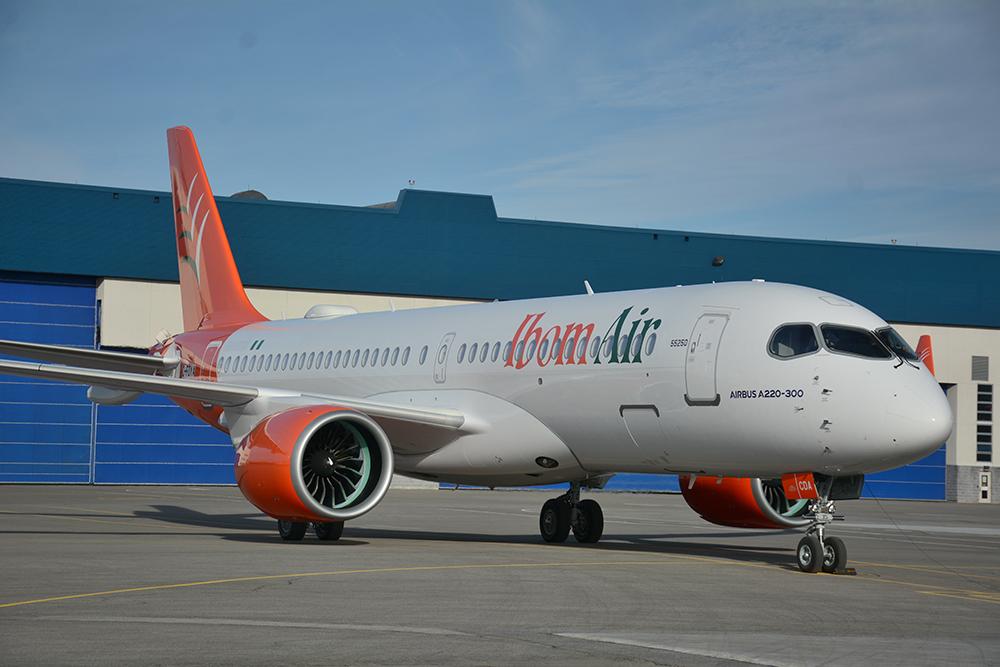
Nigerian carrier Ibom Air is looking to establish itself an MRO provider for the African continent, mirroring the likes of EgyptAir, Ethiopian Airlines and Kenya Airways.
Ibom Air, which has historically been a Bombardier CRJ900 operator, is a regional-government owned airline that launched operations in June 2019. Late last year, the Uyo-based carrier received the first of 10 direct-ordered Airbus A220-300s, joining its fleet of five CRJ900s and two A320s.
“At Ibom Air, we made a decision that we're going to do our maintenance at home,” Ibom Air COO George Uriesi said, speaking on a recent African Airlines Association webinar. “We're already almost totally able to maintain our CRJ900 fleet. We're almost there. Everything we need to do on it, we can do here, except for just a couple of things that we have to take the aeroplane out for. We're going do the same thing with the Airbus A220.”
Uriesi said Ibom Air’s shareholders invested in MRO infrastructure even before the airline was flying. More recently, Ibom Air has been working with Airbus Consulting on its maintenance strategy for the next six to eight years, which includes plans for full scope A220 work.
“We are working in collaboration with Airbus Consulting. They have helped us to put together the business plan for the MRO. It requires another level of investing, so we are busy with the financing for that,” Uriesi explained. “The investment is quite huge for this next phase.”
Ibom Air is planning to create a “third-party maintenance center of excellence,” for the CRJ900, A220 and “a couple of other aircraft types” operated by third-party clients.
“It is going to require a lot of upskilling,” Uriesi said, noting that finding qualified maintenance engineers is a huge challenge. “[It] is going to require us to collaborate with an established MRO that is [European Union Aviation Safety Agency] and FAA certified, so that we can maintain anybody's aeroplanes.”
Ibom Air has plans to become “one of the largest MRO facilities in the continent,” following in the footsteps of EgyptAir, Ethiopian Airlines and Kenya Airways. “It saves them a hell of a lot, and you can’t build a successful airline without having a maintenance base to maintain your aeroplanes,” Uriesi said.
He talked about the high operating costs that African airlines face, including more expensive aircraft deals, insurance and taxes, estimating that Ibom Air pays three to four times the insurance premium of a European operator. “We're at a disadvantage. We’re coming into the boxing ring with one of our hands tied behind our back,” he said.
African operators also face exchange rate disadvantages, as most of their costs are in dollars, while their revenues are in local currency. “The business model in Africa, especially in West Africa, has been to fly aeroplanes and maintain them abroad. It's impossible to succeed on a long-term basis like that, so we are working on not falling into that trap,” Uriesi said.
Ibom Air currently serves six domestic destinations. Uriesi estimates the Nigerian domestic market at around 12-14 million passengers, with nine scheduled airlines vying for market share at around 24 active airports.
In October 2023, Ibom Air launched its first intra-African service to Accra, Ghana. The growing A220 fleet, plus imminent plans to move to an upgraded hub terminal at Ibom Air’s home base, mean the company is now gearing up for network expansion to other African markets outside of Nigeria. The A220’s capacity to serve sectors of up to seven hours will be a “key element” in this regional expansion.
“Our intention is to is to cover the whole of Africa over the next couple of years,” Uriesi said. “We're going to develop in a very careful manner, to the point where we are in a strong position as a regional airline.”
Ibom Air is considering a follow-on A220 order before the initial 10 aircraft arrive, with the aim of ultimately phasing out the CRJ900s. This could see Ibom Air add the smaller A220-100 variant to its fleet, to cover thinner routes previously served by the CRJs.
“Nigeria is changing, and the infrastructure has to change in Nigeria. It has to,” he said. “Before you do anything, you have to have a master plan.”





